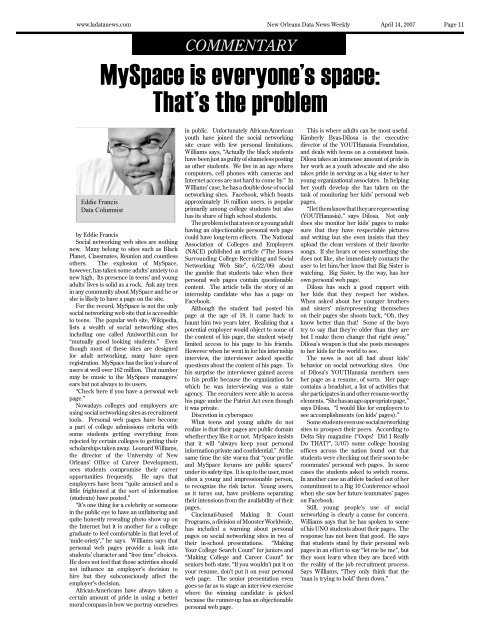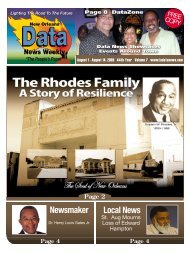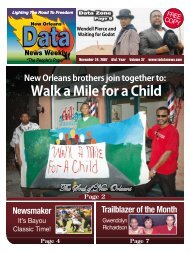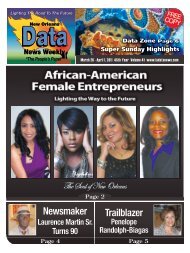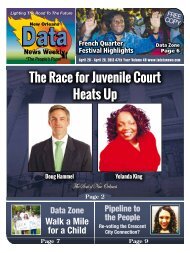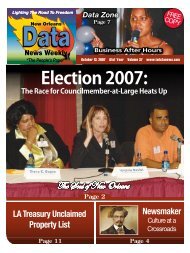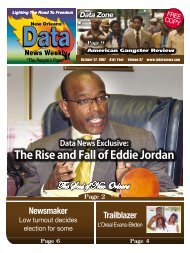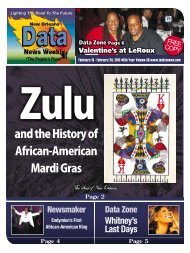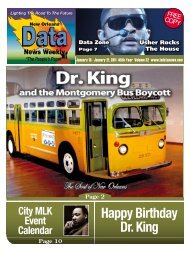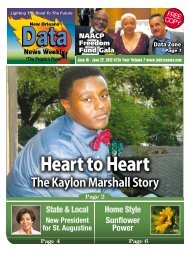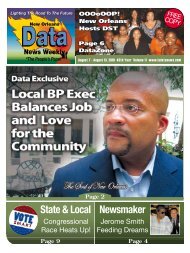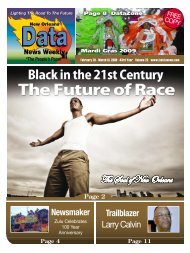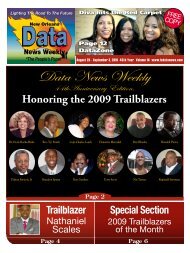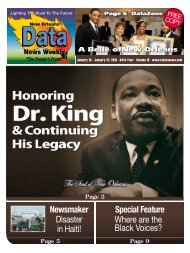New Orleans District Attorney Eddie Jordan Speaks Out
New Orleans District Attorney Eddie Jordan Speaks Out
New Orleans District Attorney Eddie Jordan Speaks Out
Create successful ePaper yourself
Turn your PDF publications into a flip-book with our unique Google optimized e-Paper software.
www.ladatanews.com <strong>New</strong> <strong>Orleans</strong> Data <strong>New</strong>s Weekly<br />
April 14, 2007<br />
COMMENTARY<br />
Page 11<br />
MySpace is everyone’s space:<br />
That’s the problem<br />
<strong>Eddie</strong> Francis<br />
Data Columnist<br />
by <strong>Eddie</strong> Francis<br />
Social networking web sites are nothing<br />
new. Many belong to sites such as Black<br />
Planet, Classmates, Reunion and countless<br />
others. The explosion of MySpace,<br />
however, has taken some adults’ anxiety to a<br />
new high. Its presence in teens’ and young<br />
adults’ lives is solid as a rock. Ask any teen<br />
in any community about MySpace and he or<br />
she is likely to have a page on the site.<br />
For the record, MySpace is not the only<br />
social networking web site that is accessible<br />
to teens. The popular web site, Wikipedia,<br />
lists a wealth of social networking sites<br />
including one called Amiworthit.com for<br />
“mutually good looking students.” Even<br />
though most of these sites are designed<br />
for adult networking, many have open<br />
registration. MySpace has the lion’s share of<br />
users at well over 162 million. That number<br />
may be music to the MySpace managers’<br />
ears but not always to its users.<br />
“Check here if you have a personal web<br />
page.”<br />
Nowadays colleges and employers are<br />
using social networking sites as recruitment<br />
tools. Personal web pages have become<br />
a part of college admissions criteria with<br />
some students getting everything from<br />
rejected by certain colleges to getting their<br />
scholarships taken away. Leonard Williams,<br />
the director of the University of <strong>New</strong><br />
<strong>Orleans</strong>’ Office of Career Development,<br />
sees students compromise their career<br />
opportunities frequently. He says that<br />
employers have been “quite amused and a<br />
little frightened at the sort of information<br />
(students) have posted.”<br />
“It’s one thing for a celebrity or someone<br />
in the public eye to have an unflattering and<br />
quite honestly revealing photo show up on<br />
the Internet but it is another for a college<br />
graduate to feel comfortable in that level of<br />
‘nude-oriety’,” he says. Williams says that<br />
personal web pages provide a look into<br />
students’ character and “free time” choices.<br />
He does not feel that those activities should<br />
not influence an employer’s decision to<br />
hire but they subconsciously affect the<br />
employer’s decision.<br />
African-Americans have always taken a<br />
certain amount of pride in using a better<br />
moral compass in how we portray ourselves<br />
in public. Unfortunately African-American<br />
youth have joined the social networking<br />
site craze with few personal limitations.<br />
Williams says, “Actually the black students<br />
have been just as guilty of shameless posting<br />
as other students. We live in an age where<br />
computers, cell phones with cameras and<br />
Internet access are not hard to come by.” In<br />
Williams’ case, he has a double dose of social<br />
networking sites. Facebook, which boasts<br />
approximately 16 million users, is popular<br />
primarily among college students but also<br />
has its share of high school students.<br />
The problem is that a teen or a young adult<br />
having an objectionable personal web page<br />
could have long-term effects. The National<br />
Association of Colleges and Employers<br />
(NACE) published an article (“The Issues<br />
Surrounding College Recruiting and Social<br />
Networking Web Site”, 6/22/06) about<br />
the gamble that students take when their<br />
personal web pages contain questionable<br />
content. The article tells the story of an<br />
internship candidate who has a page on<br />
Facebook.<br />
Although the student had posted his<br />
page at the age of 18, it came back to<br />
haunt him two years later. Realizing that a<br />
potential employer would object to some of<br />
the content of his page, the student wisely<br />
limited access to his page to his friends.<br />
However when he went in for his internship<br />
interview, the interviewer asked specific<br />
questions about the content of his page. To<br />
his surprise the interviewer gained access<br />
to his profile because the organization for<br />
which he was interviewing was a state<br />
agency. The recruiters were able to access<br />
his page under the Patriot Act even though<br />
it was private.<br />
Discretion in cyberspace<br />
What teens and young adults do not<br />
realize is that their pages are public domain<br />
whether they like it or not. MySpace insists<br />
that it will “always keep your personal<br />
information private and confidential.” At the<br />
same time the site warns that “your profile<br />
and MySpace forums are public spaces”<br />
under its safety tips. It is up to the user, most<br />
often a young and impressionable person,<br />
to recognize the risk factor. Young users,<br />
as it turns out, have problems separating<br />
their intensions from the availability of their<br />
pages.<br />
Cincinnati-based Making It Count<br />
Programs, a division of Monster Worldwide,<br />
has included a warning about personal<br />
pages on social networking sites in two of<br />
their in-school presentations. “Making<br />
Your College Search Count” for juniors and<br />
“Making College and Career Count” for<br />
seniors both state, “If you wouldn’t put it on<br />
your resume, don’t put it on your personal<br />
web page. The senior presentation even<br />
goes so far as to stage an interview exercise<br />
where the winning candidate is picked<br />
because the runner-up has an objectionable<br />
personal web page.<br />
This is where adults can be most useful.<br />
Kimberly Byas-Dilosa is the executive<br />
director of the YOUTHanasia Foundation,<br />
and deals with teens on a consistent basis.<br />
Dilosa takes an immense amount of pride in<br />
her work as a youth advocate and she also<br />
takes pride in serving as a big sister to her<br />
young organizational associates. In helping<br />
her youth develop she has taken on the<br />
task of monitoring her kids’ personal web<br />
pages.<br />
“I let them know that they are representing<br />
(YOUTHanasia),” says Dilosa. Not only<br />
does she monitor her kids’ pages to make<br />
sure that they have respectable pictures<br />
and writing but she even insists that they<br />
upload the clean versions of their favorite<br />
songs. If she hears or sees something she<br />
does not like, she immediately contacts the<br />
user to let him/her know that Big Sister is<br />
watching. Big Sister, by the way, has her<br />
own personal web page.<br />
Dilosa has such a good rapport with<br />
her kids that they respect her wishes.<br />
When asked about her younger brothers<br />
and sisters’ misrepresenting themselves<br />
on their pages she shoots back, “Oh, they<br />
know better than that! Some of the boys<br />
try to say that they’re older than they are<br />
but I make them change that right away.”<br />
Dilosa’s weapon is that she posts messages<br />
to her kids for the world to see.<br />
The news is not all bad about kids’<br />
behavior on social networking sites. One<br />
of Dilosa’s YOUTHanasia members uses<br />
her page as a resume, of sorts. Her page<br />
contains a headshot, a list of activities that<br />
she participates in and other resume-worthy<br />
elements. “She has an age-appropriate page,”<br />
says Dilosa. “I would like for employers to<br />
see accomplishments (on kids’ pages).”<br />
Some students even use social networking<br />
sites to prospect their peers. According to<br />
Delta Sky magazine (“Oops! Did I Really<br />
Do THAT”, 3/07) some college housing<br />
offices across the nation found out that<br />
students were checking out their soon-to-be<br />
roommates’ personal web pages. In some<br />
cases the students asked to switch rooms.<br />
In another case an athlete backed out of her<br />
commitment to a Big 10 Conference school<br />
when she saw her future teammates’ pages<br />
on Facebook.<br />
Still, young people’s use of social<br />
networking is clearly a cause for concern.<br />
Williams says that he has spoken to some<br />
of his UNO students about their pages. The<br />
response has not been that good. He says<br />
that students stand by their personal web<br />
pages in an effort to say “let me be me”, but<br />
they soon learn when they are faced with<br />
the reality of the job recruitment process.<br />
Says Williams, “They only think that the<br />
‘man is trying to hold’ them down.”


